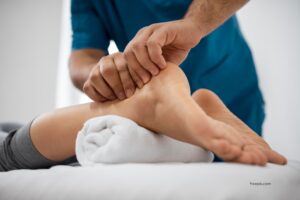Peripheral neuropathy is caused by damage to the peripheral nerves such as in the hands and feet. These nerve cells do not easily repair if damaged.
The most common symptoms caused by nerve damage are numbness, pain in the hands or feet or tingling (“pins and needles”).

Other symptoms may include:
- dizziness
- muscle weakness
- ringing in the ears
- hearing loss
- trouble sensing where your body is in space
- constipation.
Certain chemotherapy drugs can damage the nerves such as taxanes, vinca alkaloids and bortezomib
If you have symptoms such as tingling inform your treating team before your next treatment and they should have recommendations for you.
If the nerves are still tingling they have not died and symptoms can improve – symptom management can be –
- exercise is recommended to strengthen muscles, reduce pain and cramps and improve balance and circulation. Particularly balance exercise for falls prevention.
- prevent dizziness by taking your time when standing up, drinking plenty of fluids and wearing supportive stockings during the day to improve circulation
- Acupuncture – stimulates blood flow, can be effective in relieving symptoms – feel free to talk with the Bloomhill team and our Acupuncturist/s who will discuss this with any potential clients.
- There has been some research to show that reflexology can assist with reducing chemotherapy induced peripheral neuropathy. Reflexology can also assist with relaxation and pain relief and better sleep, stress and low mood, and provides a general feeling of well-being.
-
Pain medicines – you can try over-the-counter painkillers (e.g. paracetamol, ibuprofen) but these often don’t help much; your doctor may prescribe stronger pain medicines (e.g. tramadol, Gabapentin), but the side effects may mean that these are not a good long-term solution
-
Duloxetine – sometimes this antidepressant is recommended for managing peripheral neuropathy; while some studies have shown that it helps relieve numbness, tingling and pain, other studies have found no benefit.
-
TENS (transcutaneous electrical nerve stimulation, a device that sends small electrical currents to parts of the body) and certain dietary supplements are being tested in clinical trials to see whether they help with peripheral neuropathy related to cancer. Some people find magnesium cream and tablets can help ease muscle cramps in the feet and lower legs.
-
A psychologist can teach relaxation, meditation and other techniques to help with managing pain. A counsellor or psychologist can also help people adjust to any lifestyle changes caused by peripheral neuropathy.
Please contact our Nurses on 07 5445 5794 or [email protected] if you have any questions.
All information provided by Bloomhill is mainly based on research from the Qld Cancer Council and best practice guidelines. Our model of care utilizes the Clinical Oncology Society of Australia (COSA) domains of wellness along with available clinical evidence. Always consult your care team regarding matters that affect your health. This is a guide intended for information only.



